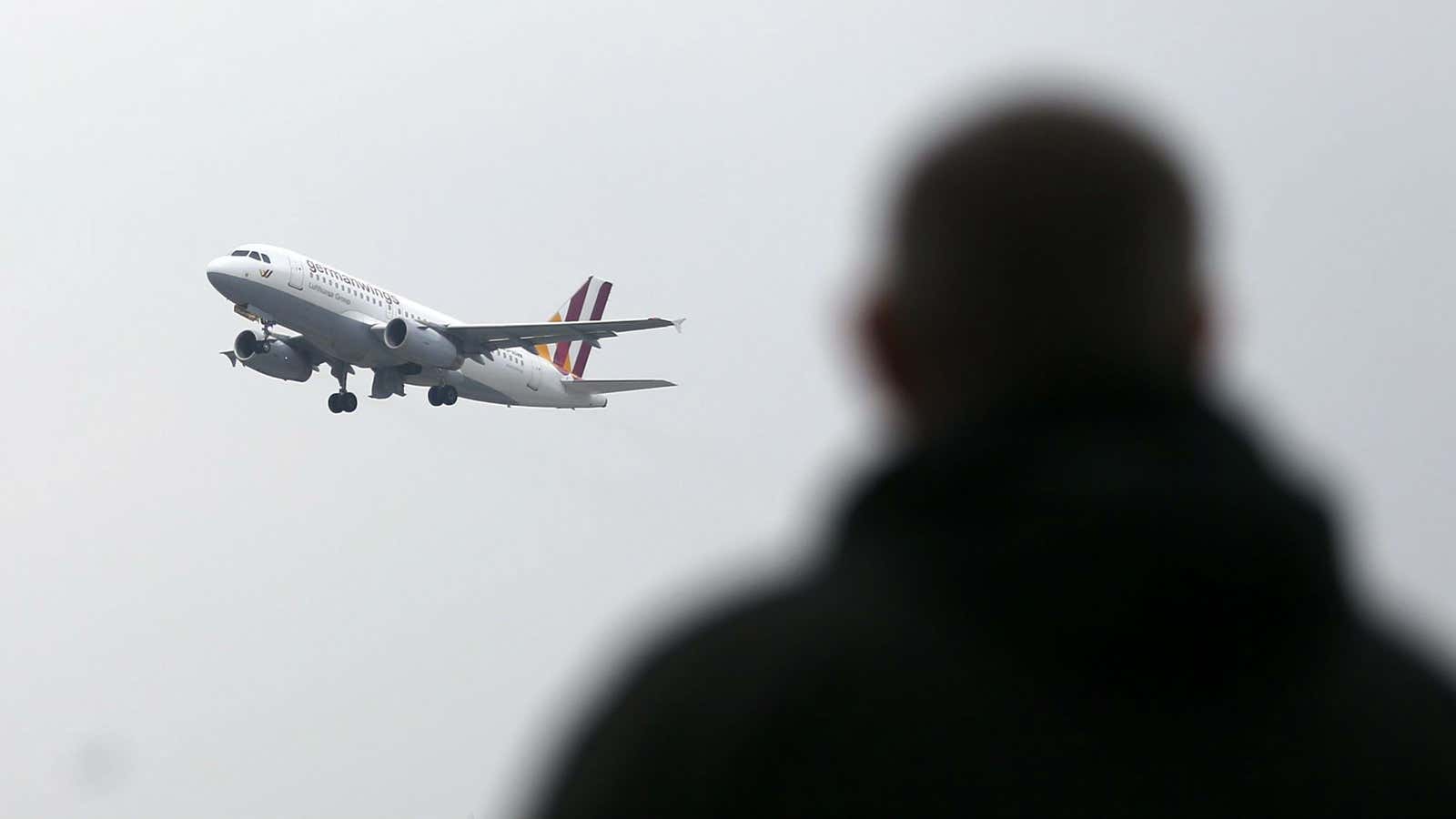The Germanwings flight that crashed on March 24 in the French Alps, killing all 150 people on board, was deliberately brought down by co-pilot Andreas Lubitz, French prosecutors said today. According to the cockpit voice recorder, Lubitz was alive and breathing as the plane descended, while the captain—locked out of the cockpit—desperately pounded on the door to be allowed back in.
Initial investigations of Lubitz suggest that the 28-year-old had no known links to terrorism or extremists, though investigators remain open to new information. Marseille prosecutor Brice Robin said the incident is being treated as a homicide. “The reason why the copilot chose to do this is unknown so far. His act can be seen as a will to destroy the plane,” he said. ”People who commit suicide usually do so alone…I don’t call it a suicide.”
Deliberate crashes by commercial pilots are not unprecedented. (And in some cases, regulators have referred to these incidents as suicides or suspected suicides.) Here are past examples:
- In a 2013 incident that resembled the Germanwings crash, a Mozambique Airlines flight was brought down deliberately by one of the pilots. The other pilot was locked out of the cockpit and pounded on the door, trying to gain entry. All 33 passengers aboard were killed.
- In 1999, an EgyptAir flight from New York to Cairo crashed in the Atlantic Ocean—the prevailing theory is that the pilot intended to bring down the plane, killing 216 passengers in the process.
- A 1997 Silk Air flight from Indonesia to Singapore crashed following a rapid descent, killing 104 people. Indonesian authorities never determined an official reason for the crash, but the US NTSB suggested it may have been the result of a pilot suicide.
Despite the smattering of high-profile crashes, suicides via plane crashes are still rare. An FAA report from 2014 revealed that eight out of 2,758 fatal aviation accidents between 2003 to 2012 were suicides. All pilots involved were male, with a median age of 46. In seven of the eight crashes, the pilot was the sole occupant of the downed aircraft. Four of them tested positive for alcohol, and two of them were positive for antidepressants.
“Based on the limited accidents conclusively attributed to suicide, death by the intentional crashing of an aircraft is an infrequent and uncommon event and has declined compared to the previous 20 years,” the report concluded.
The FAA requires that all pilots younger than age 40 have their medical certificates renewed annually, while pilots 40 and older must have them renewed every six months. Part of the medical examination involves an assessment of psychological condition, but there is no official mental health exam.
“The FAA does not expect the Examiner to perform a formal psychiatric examination,” the FAA guidelines state. “However, the Examiner should form a general impression of the emotional stability and mental state of the applicant.”
Like the FAA, the European Aviation Safety Agency, the authority that would have issued Lubitz’s certificate to fly, has general medical exams that touch on mental health, but it does not mandate routine mental health exams.
For the most part, commercial airline pilots—many of whom are military veterans—are stable, well-adjusted people. But pilots with mental health problems do fall through the cracks. In 2012, a JetBlue pilot with no known mental health issues, who had never raised any alarm, experienced a mid-flight “breakdown,” forcing passengers and crew to subdue him. He was later determined to be legally insane. In 2010, amid concerns that pilots might avoid disclosing mental health problems to keep their jobs, the FAA lifted a ban on use of antidepressants like Prozac and Zoloft for commercial pilots.
Concerns have also been raised about the growing stresses on commercial pilots, as airlines have scrambled to make up for a pilot shortage, the lack of sleep hampering pilots on the job, and cuts to pilots’ benefits and pensions due to financial woes. That said, in the vast majority of cases, these stresses have not contributed to a desire to deliberately crash a plane.
Quartz’s full coverage of the Germanwings crash can be found here.
